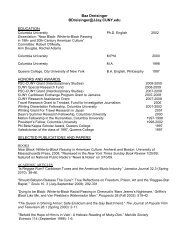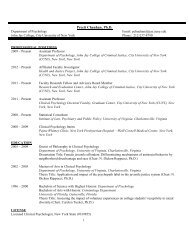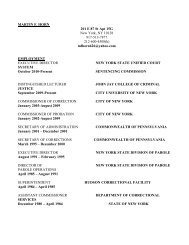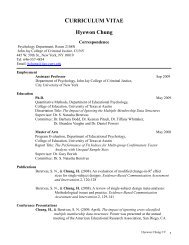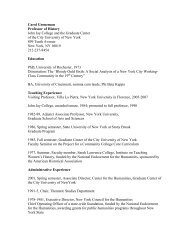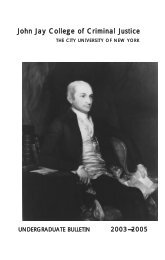Bulletin - John Jay College Of Criminal Justice - CUNY
Bulletin - John Jay College Of Criminal Justice - CUNY
Bulletin - John Jay College Of Criminal Justice - CUNY
You also want an ePaper? Increase the reach of your titles
YUMPU automatically turns print PDFs into web optimized ePapers that Google loves.
Courses <strong>Of</strong>fered<br />
of different theoretical perspectives in economics on urban analysis<br />
and policy are considered.<br />
Prerequisites: ENG 101, and ECO 101 or ECO 170, or permission of<br />
the section instructor<br />
ECO 280 Economics of Labor<br />
3 hours, 3 credits<br />
Problems and issues in labor economics; wages, hours, and working<br />
conditions; trade unionism in the United States; interrelationship of<br />
wages, productivity and employment; labor in relation to business,<br />
government and economic change; economics of social insurance;<br />
collective bargaining and techniques of arbitration; current<br />
conditions.<br />
Prerequisites: ENG 101, and ECO 101, or permission of the<br />
instructor<br />
ECO 315 An Economic Analysis of Crime<br />
(Same course as PSC 315)<br />
3 hours, 3 credits<br />
Crimes with economic motivations are analyzed using the Economic<br />
Theory of Crime. Topics focus on urban problems including<br />
narcotics, illegal gambling, loan-sharking, labor racketeering and<br />
organized crime. Costs of crime and imprisonment are discussed.<br />
Strengths and weaknesses of the Economic Theory of Crime are<br />
discussed from alternative points of view.<br />
Prerequisites: ENG 102 or ENG 201, ECO 101 or ECO 170, and<br />
junior standing or above<br />
ECO 324 Money & Banking<br />
3 hours, 3 credits<br />
The course covers the theoretical and practical aspects of decisionmaking<br />
and modeling within financial institutions. We examine<br />
banking operations and the changing forms and functions of money<br />
in the context of risk, capital and business cycles across real (nonfinancial)<br />
and financial sectors. Topics include investment, assetliability<br />
management, portfolio management, take over, mergers &<br />
acquisition, derivatives and option strategy, SEC and Basel II<br />
regulations, micro credit, digital money, credit, securities regulation,<br />
fraud prevention. We look at global movements of money and the<br />
roles of the World Bank, International Monetary Fund and the World<br />
Trade Organization, and examine how money affects international<br />
politics and justice.<br />
Prerequisites: ENG 102 or 201, ECO 220<br />
ECO 360 Corporate and White-Collar Crime<br />
(Same course as SOC 360)<br />
3 hours, 3 credits<br />
In examining crimes committed by corporations and organizations, as<br />
well as individuals in the course of their occupation, this course<br />
explores how such crimes are socially defined, who commits them,<br />
who is victimized by them, which social contexts promote them, and<br />
how society responds to them. The economic, social, and political<br />
costs of corporate and white-collar crime are compared to street<br />
crime. Other topics include embezzlement, fraud, and theft, which<br />
occurs within enterprises, "underground" economic activity; criminal<br />
violation of antitrust and environmental laws, security, fiduciary and<br />
market crimes; and corrupt relationships between business and<br />
government. Members of either the economics or sociology faculties<br />
teach this course with varying emphasis on the above topics.<br />
Prerequisites: ENG 102 or ENG 201, junior standing or above, SOC<br />
203, and one course in economics<br />
ECO 405 Seminar in Economics and Crime<br />
3 hours, 3 credits<br />
This course explores the contributions of economics to the<br />
understanding of crime and criminal justice. The perspectives and<br />
quantitative analytical techniques of economics are used to examine<br />
important issues concerning crime and criminal justice. Topics may<br />
include: rational-choice criminology, macroeconomics and crime,<br />
Marxian criminology, economic justice, measuring the costs of<br />
77



